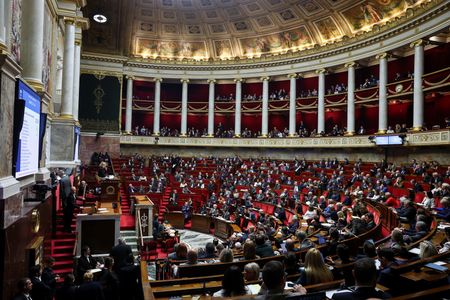By Leigh Thomas
PARIS (Reuters) -France's education budget is being squeezed by its pension system: of the 90 billion euros earmarked for schools next year, more than a quarter will go to retired teachers rather than under-resourced classrooms, Reuters calculations show.
The retirement scheme is under strain from demographic shifts and rising costs, leaving fewer resources to tackle falling student performance and highlighting the challenge of funding pensions without starving public services.
French 15-year-olds ranked second-lowest in maths among G7 nations in 2022 tests, last in reading, and tied with Italy to come bottom in science — their worst scores yet, according to Organisation for Economic Cooperation and Development data.
The education ministry insists spending on schools has increased since President Emmanuel Macron took office in 2017, but unions say that claim falls flat once pensions are stripped out and inflation is factored in.
French parents are outraged over swelling class sizes, ageing school buildings and absent teachers who are not replaced as the government tries to keep costs down.
"If the world's seventh biggest economy can't fund education for its citizens, it's incomprehensible and scandalous," said Gregoire Ensel, parent of a high-school student and vice president of a national parents' federation.
"We don't want to hear the argument that 'it costs too much'", he said, with education an investment in the future.
PAY-AS-YOU-GO MODEL UNDER PRESSURE
Pensions are a highly charged issue in France, where the government has faced persistent threats to its survival since Macron's snap election last year left him with a hung parliament.
Past attempts to overhaul the system have sparked protests, and just this month, lawmakers suspended the president's flagship 2023 reform to raise the retirement age to 64 from 62 as part of negotiations to approve the 2026 budget.
France's pay-as-you-go system, a post-war welfare legacy, relies almost entirely on payroll contributions. Most Western peers typically mix in private savings, which eases the pension burden on the public finances.
More than 28% of the 2026 education budget is earmarked for pension contributions, Reuters found, by analysing hundreds of pages of government data in next year's budget.
France's system is vulnerable to the same demographic trends rippling across ageing Europe, and faces growing pressure as the baby-boomer generation leaves the workforce and starts to draw their retirement income.
The demographic imbalance is particularly acute in the public sector where successive pushes to keep civil servant numbers down mean there is less than one worker per retiree, versus 1.4 in the private sector.
And the impact is sharpest in the public education system, which employs over half of France's more than 2 million civil servants in the state administration.
THE FRENCH PARADOX
At first glance, France's headline spending on education, worth 5% of GDP, looks more generous than the 4.7% EU average. But after stripping out pensions, spending falls to 4.6%, said economist Helene Paris at Conseil d'Analyse Economique think tank.
Spending per primary school pupil falls to 7,726 euros a year without pensions from 8,450 with them, calculations by Institut des Politiques Publiques, another think tank, show.
Pension outlays explain the paradox of education spending that is higher than many peers but still results in bigger average class sizes and less well-paid teachers, said education economist Julien Grenet with the Paris School of Economics.
"French education spending is artificially inflated due to an accounting norm," he said.
DECLINING TEST SCORES
France's declining test scores have been a source of anguish in a country where education was once considered world-class.
However, experts say there is no quick fix.
Increasing teacher numbers or paying them more would be a costly solution as the state pays payroll contributions to the pension system equal to 78% on every public worker's wages, compared with only 16.5% in the private sector.
As France struggles to rein in its budget deficit, the government instead plans to cut 4,000 teaching jobs next year, citing falling student numbers.
FAILINGS COULD FUEL FAR RIGHT SUPPORT?
France's strained pensions system not only affects education. The country spends nearly 16% of its defence budget on military pensions, complicating its defence build-up plans, Reuters reported earlier this year.
Budget Minister Amelie de Montchalin said last month that the government would revamp how it accounts for public sector pensions in the 2027 budget so that the real cost would be more transparent.
Change might be too late for voters fed up with the school systems' failings, fuelling frustration among parents and creating another grievance that could boost support for France's rising far right.
"The issue of education is at the heart of the debate on combating the far right," said Ensel of the parents' federation. "We have been saying this for a very long time, but no one is listening."
($1 = 0.8677 euros)
(Reporting by Leigh Thomas, Editing by Gabriel Stargardter and Ros Russell)










